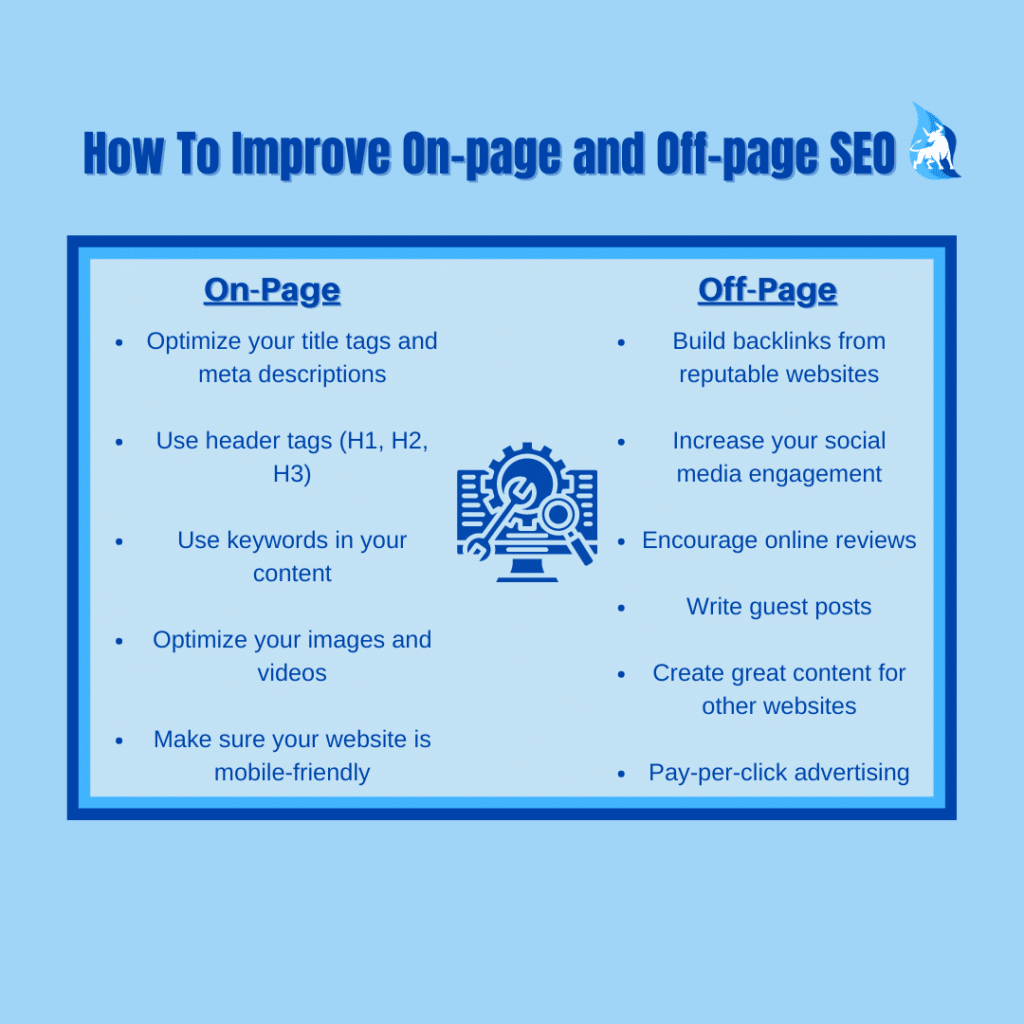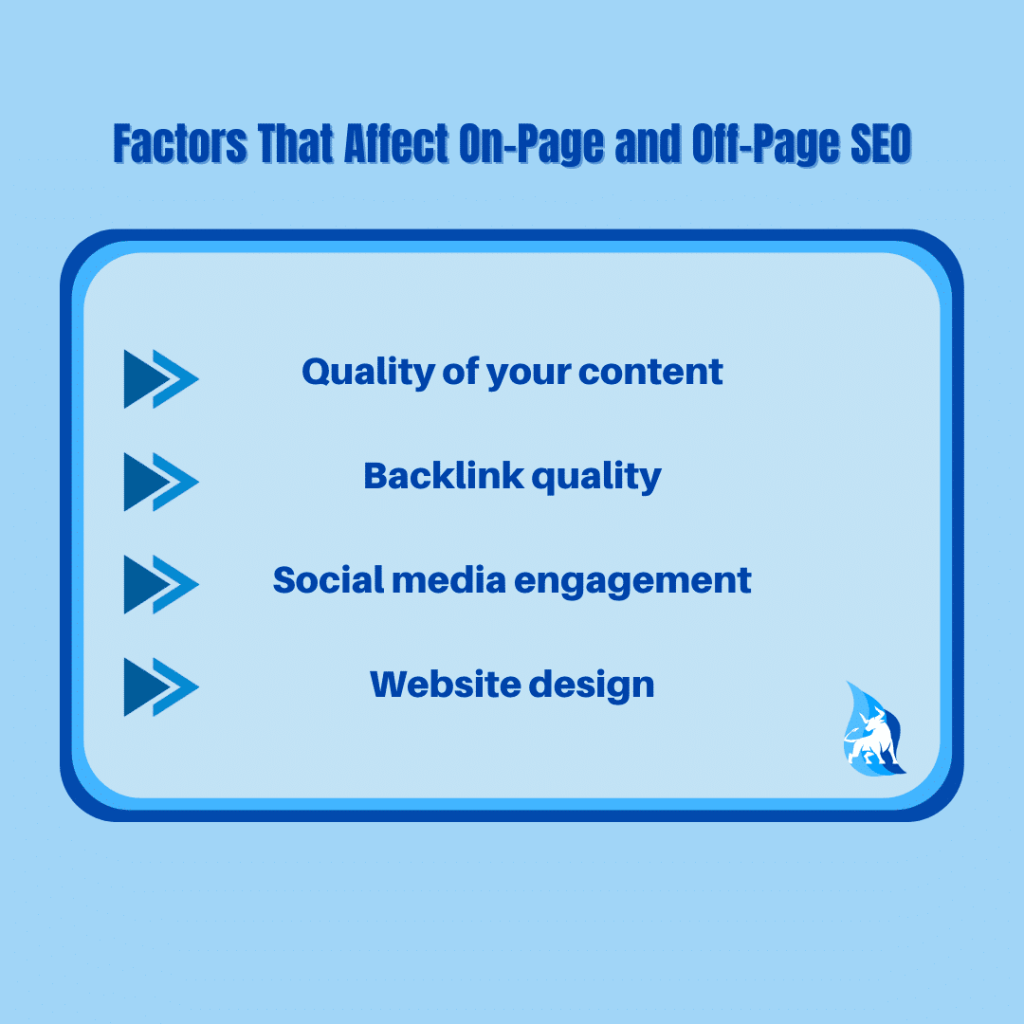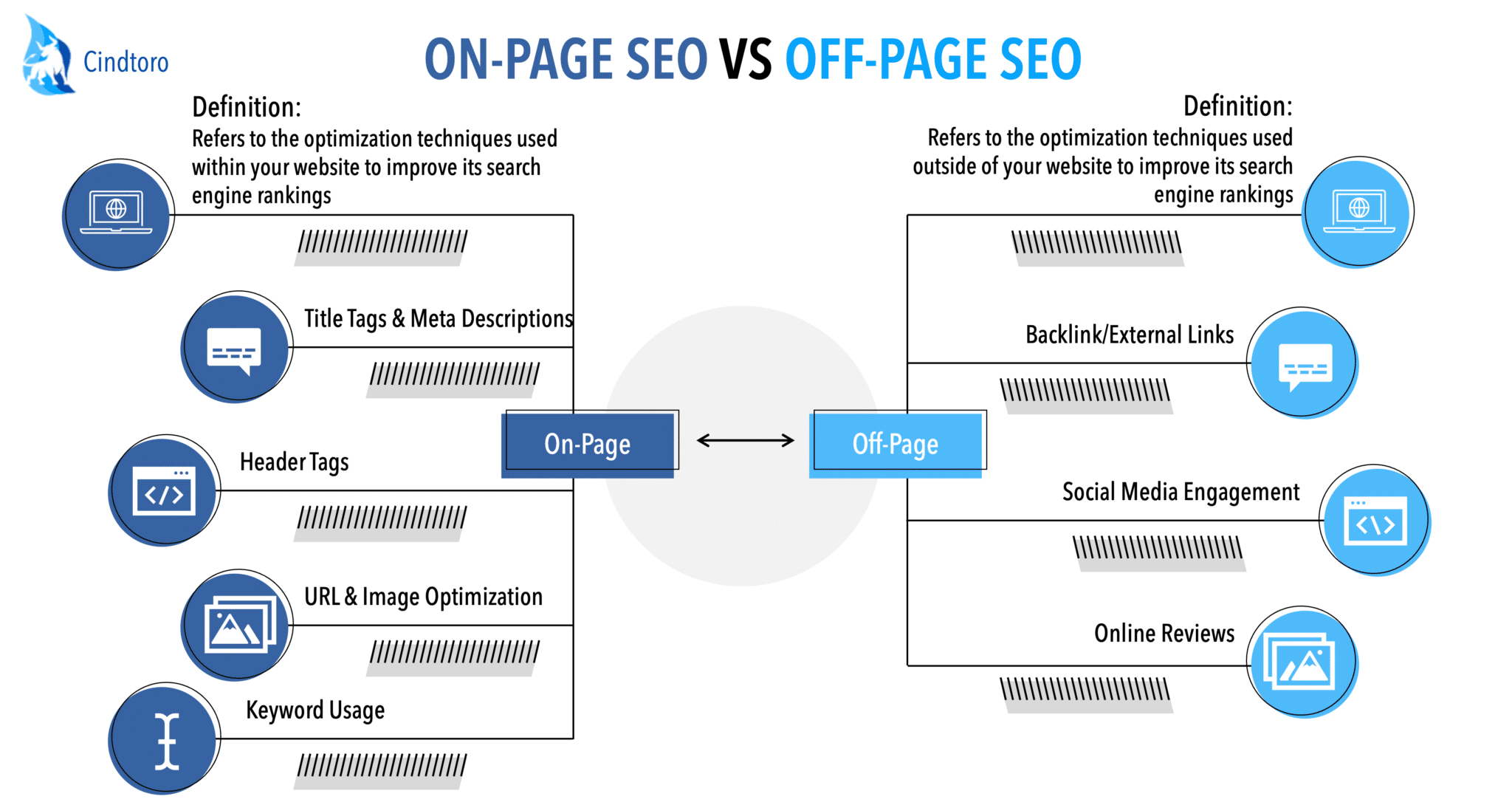Learn About What the Differences are Between On and Off Page SEO, Why They Matter, and How to Make Improvements
Do you need help improving your website’s search engine rankings? On-page and off-page SEO are crucial in achieving high search engine rankings and increasing more targeted traffic to your website.
By understanding the difference between on-page and off-page SEO and implementing effective techniques, you can improve your website’s success by sharing your content and attracting more customers to your business. Keep reading to learn about these SEO techniques, why they matter, and how to improve them for your website.
What Is On-Page SEO?
On-page SEO refers to the optimization techniques used within your website to improve its search engine rankings. These page SEO factors includes title tags, meta descriptions, header tags, url & image optimization and keyword usage within the content of your website. It helps search engines to determine what your website is all about and how it should be crawled and indexed which is quite important to your website’s search ranking.
On-page SEO consists of the optimization of titles and meta descriptions for each of your website’s pages. Doing this ensures the web pages are more visible in search engine results.
Titles should contain keywords, be concise, and accurately describe the page. Meta descriptions should also include keywords and be as descriptive as possible. They should also remain within the character limit for the meta description.
Additionally, on-page SEO focuses on optimizing header tags, such as H1 and H2 tags, to make content easier to read and understand. And using keywords throughout the content of your website will ensure that search engines can properly index your pages.
What Is Off-Page SEO?
Off-page SEO refers to the optimization techniques used outside of your website to improve its search engine rankings. That includes backlinks/external links, social media engagement, and online reviews. Off-page SEO is important because it helps search engines understand how popular and reputable your website is based on the brand mentions.
Off-page SEO includes building backlinks from other websites to your own. Quality backlinks from reputable websites can improve your website’s search engine rankings and help drive more traffic to your website, helping your website to rank higher.
Additionally, off-page SEO focuses on increasing engagement on social media platforms such as Instagram and Facebook. Social media posts can raise brand awareness and help you reach new audiences.
Finally, off-page SEO includes improving your website’s online reviews. Positive reviews from customers will make your website appear more credible and trustworthy in the eyes of search engines. That can help boost your rankings and drive more traffic to your website.
Overall, on-page and off-page SEO are essential in improving your website’s search engine rankings. However, understanding the difference between them and implementing effective optimization techniques can improve your website’s visibility and reach more customers.
Why Do On-Page and Off-Page SEO Matter?
When creating a proper SEO strategy both are important for improving your website’s search engine rankings and driving traffic that helps your overall position in the search results. On-page SEO helps search engines understand what your website is about. While off-page SEO helps search engines understand how popular and reputable your website is to your target audience. The aim is to have your website appear in the search intent of users that are looking to research things that your business has to offer.
Also, improving your on-page and off-page SEO can help you gain a competitive edge over your competitors. And that’s because search engines reward websites that are properly optimized for their algorithms.
How Do On-Page and Off-Page SEO Contribute to Your Website’s Success?
By optimizing your website for on-page and off-page SEO, you can also increase the user experience of your website. On-page SEO is excellent for creating a more relevant and user-friendly website. Additionally, off-page SEO can help you generate more inbound links, drawing more traffic to your website. It is important that other authoritative websites contain links to your site to establish trust in your content and offerings.
How to Improve Your On-Page and Off-Page SEO

Improving your on-page and off-page SEO is very rewarding over time. There are a variety of techniques you can use to improve, which includes the following:
For On Page SEO
On-page SEO involves optimizing each page of your website to make it easier for search engines to understand. So, to improve your on-page SEO, you can do the following:
- Optimize your title tags and meta descriptions
- Use header tags (H1, H2, H3)
- Use keywords in your content
- Optimize your images and videos
- Make sure your website is mobile-friendly
For Off-Page SEO
Off-page SEO involves optimizing your external web presence to improve your search engine rankings. To improve your off-page SEO, you can do the following:
- Build backlinks from reputable websites
- Increase your social media engagement
- Encourage online reviews
- Write guest posts
- Create great content for other websites
- Pay-per-click advertising
These are just a few SEO tips to improve your on-page and off-page SEO. If you want to get the most out of your website, hire a professional SEO company. They will help you identify the most effective techniques for your website.
Factors That Affect On-Page and Off-Page SEO

Several ranking factors can affect your website’s SEO. Some of these factors worth mentioning include the following:
Quality of your content: The quality and relevance of your content can affect your on-page SEO.
Backlink quality: The quality and relevance of the websites linking to your website can affect your off-page SEO.
Social media engagement: The amount of engagement your website receives on social media can affect your off-page SEO.
Website design: The design and functionality of your website can affect both your on-page and off-page SEO.
By understanding these factors, you can tailor your website’s content and design to improve your on- and off-page SEO. And reap the rewards of increased traffic and visibility.
Take Action and Improve Your SEO Today
If you want to improve your website’s search engine rankings and drive more traffic to your business, focus on both on-page and off-page SEO. By implementing effective techniques and understanding the factors that affect your SEO, you can achieve higher search engine rankings and attract more customers to your business. After you have made the optimizations for both on and off page SEO you can use domain authority to predict how well your site will rank on the SERP.
We can help you today to learn more about our SEO, PPC, and website design services. We’ll help you take your online presence to the next level and attract more customers to your business.

